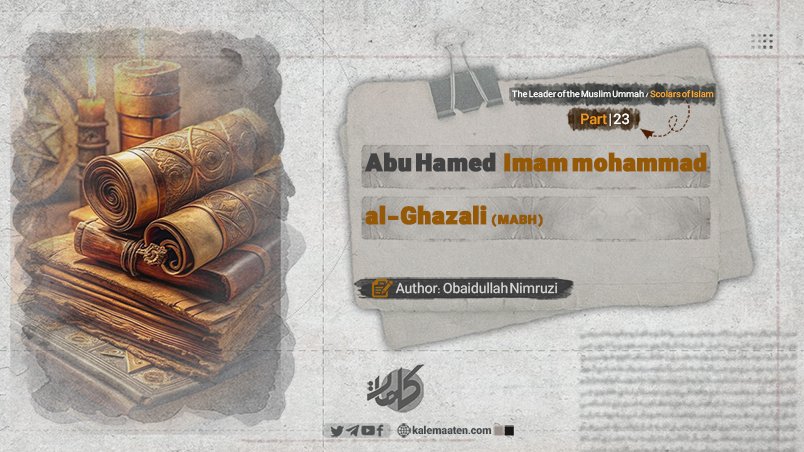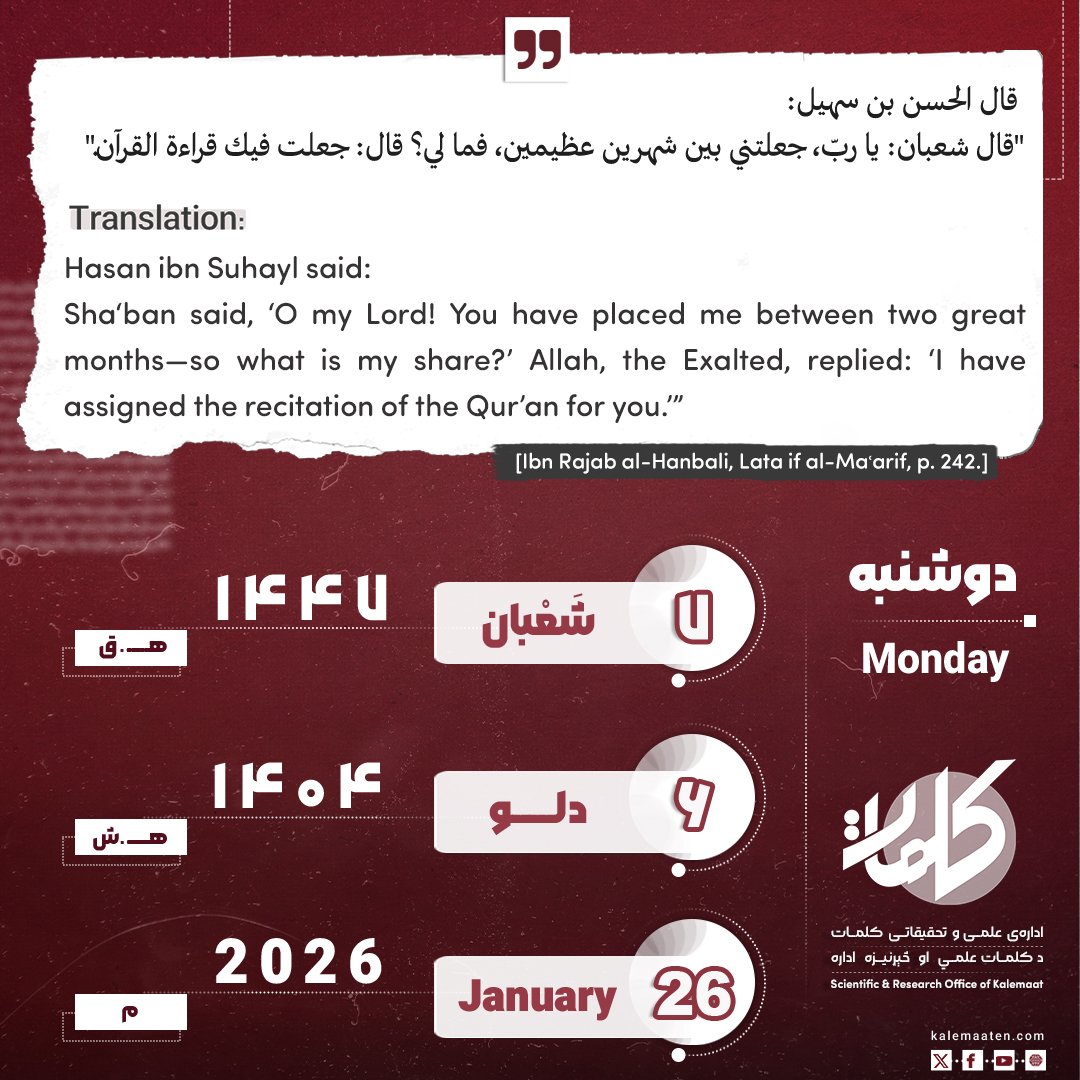
Author: Obaidullah Nimruzi
The Biography of Abu Hamed Imam Mohammad al-Ghazali [MABH] (Part 23)
Introduction
The history of human societies shows that societies have always been exposed to intellectual, moral, and social crises in different periods. In some cases, these crises have resulted from internal weaknesses, such as the decline of moral values, lack of spirituality, and the weakening of educational and religious institutions, and in others, they have resulted from the influence of external factors, such as cultural attacks, the influence of deviant ideas, and the political domination of foreigners. In such circumstances, reform and educational efforts have been proposed as one of the basic solutions to revive societies and return them to the right path.
In the history of Islam, many thinkers, reformers, and scholars have tried to save Islamic society from intellectual and moral deviations and harms by compiling scientific works, providing reform solutions, and pursuing educational programs. Among these prominent figures, Imam Muhammad al-Ghazali, may Allah bless him, is one of the most influential Islamic thinkers and reformers who, in the fifth century AH, created a profound transformation in the field of ethics, Islamic education, and religious reform by writing the book Ihya’ al-Ulum al-Din. This work can be considered one of the most comprehensive and influential Islamic books in the field of moral and spiritual education that has been able to influence a wide range of Islamic societies.
It is necessary to look at the historical and social context of this composition before examining the content of this valuable work. The fifth century AH was a period full of turmoil and changes in the Islamic world. On the one hand, the Abbasid Caliphate was weakening and local powers were competing with each other. On the other hand, the intellectual and religious divisions among different Islamic sects, especially among jurists, theologians, and Sufis, had caused scientific and doctrinal differences to sometimes turn into social and political conflicts. In addition, moral corruption among some social classes, including some of the scientific and political elites, had caused many people to distance themselves from religious teachings and limit religion to appearances and customs. In such an environment, Imam Ghazali (may Allah bless him), who was one of the most prominent theologians and jurists of his time, after going through various scientific and practical stages, came to the conclusion that the way to save the Islamic nation lies not in futile jurisprudential and theological debates, but in returning to the true spirit of religion and the inner reform of individuals.
In a previous study, the role of kings and rulers in the reform and corruption of Islamic society was examined and it was shown how rulers, through their policies, can determine the path of guidance or degeneration of a nation. But along with this dimension, the moral and spiritual reform of individuals is also essential; because a society consists of individuals, and if these individuals are not morally and spiritually reformed, any governmental and social reform will not last. Accordingly, Imam Ghazali (may Allah bless him) tried to create a bridge between jurisprudence and Sufism in Ihya’ al-Ulum al-Din, and to introduce religion not only in the form of rules and acts of worship, but also as a comprehensive educational, moral, and cognitive system.
This research aims to analyze the structure and content of the Ihya’ al-Ulum al-Din, while examining the goals and motivations of Imam Ghazali (may Allah bless him) in writing this work. One of the most important aspects of this book is the provision of practical solutions for reforming the soul, refining morality, and achieving worldly and hereafter happiness. In this regard, the Ihya’ al-Ulum al-Din can be examined as a work that seeks to create a balance between the external and internal dimensions of religion.
Another important point that will be addressed in this research is the examination of the extensive effects of this book on intellectual and reform movements after Imam Ghazali (may Allah bless him). Many thinkers, reformers, and scholars throughout history have been inspired by the teachings of this work, and have tried to reform Islamic societies within its framework. Along with these positive effects, some criticisms have also been made of the Ihya’ al-Ulum al-Din, including from some jurists and scholars of hadith who believed that the book deviated from the hadith framework in some topics. In this study, while examining these criticisms, an attempt will be made to evaluate their accuracy and effectiveness. Considering that Islamic societies are also facing numerous intellectual and moral challenges in the contemporary era, studying and examining the book Ihya’ al-Ulum al-Din can inspire reform programs in the current situation. Today, problems such as religious extremism, superficiality in religion, crisis of religious identity, weakening social morality, and distancing from Islamic values threaten Muslim societies. In these circumstances, the teachings of Imam Ghazali, may Allah bless him, can pave the way for a return to religious authenticity and spirituality. Therefore, this study will attempt to examine the historical and scientific aspects of this work, as well as the possibility of using it to solve contemporary crises.
Research Structure
This study is organized into several main sections to achieve this goal,
-
Examining the historical and social context of the writing of Ihya’a Ulum al-Din: In this section, the intellectual, social, and political conditions of Imam al-Ghazali’s era will be examined and his position among contemporary scholars will be analyzed.
-
Analyzing the structure and content of the book: This section includes examining the four main pillars of Ihya’a Ulum al-Din, namely, worship, habits, dangers, and salvations, and it will be shown how this structure provides a comprehensive system for reforming the individual and society.
-
Historical Impacts and Criticisms of the Book: In this section, the effects of this work on thinkers after Imam Ghazali’s era, positive and negative reactions to it, and scientific criticisms of some of its topics will be examined.
-
Contemporary applications of the teachings of the Ihya’a Ulum al-Din: In the final section, an attempt will be made to show how the teachings of this book can be used to confront the moral and social crises of Islamic societies in contemporary times.
It is hoped that this research can explain the role of this precious work in the path of reviving spirituality and morality in Islamic societies and provide solutions for utilizing its teachings in solving the intellectual and moral crises of the present era.
Continues…



